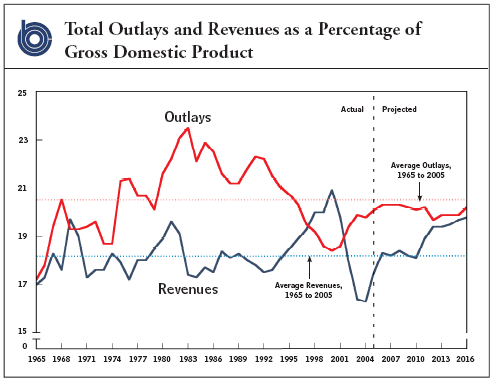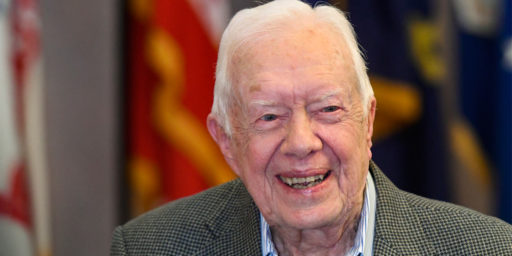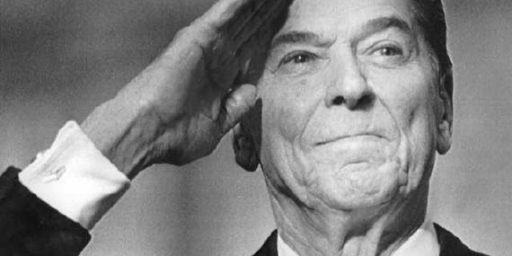Democrats, Republicans and the Deficit
hilzoy, reflecting on a pay-per-view Paul Krugman column arguing that, for political reasons, “Given a choice between cutting the deficit and spending more on good things like health care reform, Democrats in Congress should choose the spending,” observes,
[I]t has not escaped my notice that Democrats’ hard work at cutting the deficit, and our willingness to postpone a lot of things we think badly need doing for the sake of fiscal responsibility, have in practice served only to allow Republicans to rack up more debt without having to face the consequences. The Democrats have spent the last thirty years being fiscally responsible.
The Republicans in the audience are laughing uproariously, I’m sure. But hilzoy backs her assertion up with a graph produced by the Congressional Budget Office in August tracking federal budget outlays as a percentage of GDP:

She looks at the numbers and concludes, “So: Republicans (Nixon, Reagan/Bush) massively increase the deficits. We (Carter, Clinton) come in and bring the deficit under control again.”
Let’s leave aside for the moment that Congress passes budgets and presidents sign them. Since FDR’s administration, presidents have proposed budgets, asserting a strong (and quite possibly unconstitutional) influence on the process. But even if we ignore which party controls the Congress, the chart doesn’t quite say what hilzoy says it does.
 Carter served from January 1977 to January 1981. “His” first budget would have been October 1977 to September 1978 and his last ending in September 1981. He canceled some big ticket defense items but also started a trend toward high tech defense spending, gave away the Panama Canal, let terrorists take over an occupy our embassy in Iraq, lusted in his heart, and got attacked by a rabbit. Using my crude graphics talents, we see “his” slice of the graph at right. It certainly appears the outlay line trends mostly upward. [Note: Click on this or any of the thumbnails below for a larger image.]
Carter served from January 1977 to January 1981. “His” first budget would have been October 1977 to September 1978 and his last ending in September 1981. He canceled some big ticket defense items but also started a trend toward high tech defense spending, gave away the Panama Canal, let terrorists take over an occupy our embassy in Iraq, lusted in his heart, and got attacked by a rabbit. Using my crude graphics talents, we see “his” slice of the graph at right. It certainly appears the outlay line trends mostly upward. [Note: Click on this or any of the thumbnails below for a larger image.]
 Carter was succeeded in office by Ronald Reagan, who served two terms (January 1981 to January 1989), and ten George H.W. Bush, also a Republican, who served January 1989 to January 1993. Their terms coincided with a massive increase in defense spending, a big tax cut followed by two comparatively small tax hikes, the end of the Cold War, and wars in Panama and the Persian Gulf region. Their budget slice is at right. We have a short spike, a long dip, followed by a short spike, ending with a dip.
Carter was succeeded in office by Ronald Reagan, who served two terms (January 1981 to January 1989), and ten George H.W. Bush, also a Republican, who served January 1989 to January 1993. Their terms coincided with a massive increase in defense spending, a big tax cut followed by two comparatively small tax hikes, the end of the Cold War, and wars in Panama and the Persian Gulf region. Their budget slice is at right. We have a short spike, a long dip, followed by a short spike, ending with a dip.
 They are followed by Bill Clinton, a New Democrat who presided over a land of milk and honey. Peace and prosperity were the order of the day (except for numerous terrorist strikes by an obscure outfit named “al Qaeda” that twice declared war on the West). Thanks to Al Gore’s breaking of ashtrays on a late night talk show, spending was slashed. (It also helped that the end of the Cold War allowed massive cuts in Defense, the largest pile of discretionary money in the budget.) Plus, money poured in thanks to the irrationally exuberant dot.com boom, spurred by Gore’s invention of the Internet(s). Their slice of the graph (October 1993 to September 2001) is an almost continuous dip in outlays with a steady rise in revenue.
They are followed by Bill Clinton, a New Democrat who presided over a land of milk and honey. Peace and prosperity were the order of the day (except for numerous terrorist strikes by an obscure outfit named “al Qaeda” that twice declared war on the West). Thanks to Al Gore’s breaking of ashtrays on a late night talk show, spending was slashed. (It also helped that the end of the Cold War allowed massive cuts in Defense, the largest pile of discretionary money in the budget.) Plus, money poured in thanks to the irrationally exuberant dot.com boom, spurred by Gore’s invention of the Internet(s). Their slice of the graph (October 1993 to September 2001) is an almost continuous dip in outlays with a steady rise in revenue.
 In 2000, Al Gore won the popular vote but, thanks to a conspiracy at the Supreme Court, the evil thieving of Ralph Nader, and some pro-Buchanan Jews in Palm Beach, Florida, George W. Bush won the Electoral Vote. He somehow got re-elected in 2004, despite the fact that John Kerry was a war hero and really, really smart. Anyway, his term has been characterized by tax cuts (for the class of people rich enough to actually pay taxes, of course) and profligate spending on social programs. There was also an inherited recession (it technically became a recession during his term, but the first two quarters of the required three were in Clinton’s term, owing to a crash of the aforementioned dot.com bubble for which no president is responsible), which was exacerbated by the 9/11 attacks by those al Qaeda people mentioned earlier. Oh, and a war on terrorism and the invasion, occupation, COIN, and rebuilding of Iraq. His slice of the graph so far (no point in including projections, which are meaningless) mostly trends upward.
In 2000, Al Gore won the popular vote but, thanks to a conspiracy at the Supreme Court, the evil thieving of Ralph Nader, and some pro-Buchanan Jews in Palm Beach, Florida, George W. Bush won the Electoral Vote. He somehow got re-elected in 2004, despite the fact that John Kerry was a war hero and really, really smart. Anyway, his term has been characterized by tax cuts (for the class of people rich enough to actually pay taxes, of course) and profligate spending on social programs. There was also an inherited recession (it technically became a recession during his term, but the first two quarters of the required three were in Clinton’s term, owing to a crash of the aforementioned dot.com bubble for which no president is responsible), which was exacerbated by the 9/11 attacks by those al Qaeda people mentioned earlier. Oh, and a war on terrorism and the invasion, occupation, COIN, and rebuilding of Iraq. His slice of the graph so far (no point in including projections, which are meaningless) mostly trends upward.
If we factor out variables other than the party of the presidency, it seems to me that we get a wash. Mostly “irresponsibility” under Democrat Carter but mostly “fiscal restraint” under Democrat Clinton. A roller coaster under Republicans Reagan and Bush 41 but mostly “restraint” compared to their entry point but mostly “irresponsibility” under Bush 43. If, however, we consider that there are external events that trigger spending and produce revenue over which presidents have little control, then it gets messier.
UPDATE: As to the Krugman question, I think he’s right as far as it goes. The voters are far more likely to reward spending on something they like than to punish for the resulting deficits.






The two biggest mistakes in their analysis are not realizing that there is a substantial and frequently varying time lag between major economic policy shifts and the effects of those policy shifts, and trying to act as though saying ceteris paribus makes it so.
Charles: True, that. Looking at economic data bounded by a presidential administration and giving credit or blame to that president for what happens then is plainly silly on a whole number of levels. It’s a fun exercise, though.
I think Charles is exactly right.
The point missed by Krugman’s brand of pontification is that -popular- polices are not always -good- policies, and that, despite the fact that short term revenues might increase along with “irresponsible” spending, we’re in for a long term (or not-so-long term) crash in the event that Congress doesn’t do something to balance the ledger a little better. Certainly, if and when it happens, there will be more than enough blame to go around, and few if any of the truly culpable parties will be held accountable (many of whom will either have volunteered or been forced to retire by that point), but it’s a truly sad commentary on the state of federal policy-making that BOTH sides are absolutely focused on what will win them the next election at the cost of what will make this country strong.
From my vantage, it looks like the voters soundly rejected that policy foundation this year. I can only hope that if the new majority decides to play the same game that a similar rejection will be forthcoming. I doubt that anyone would learn its lesson in that event, however.
If you take the three variables (economic prosperity, control of the house and control of the presidency), what the data shows is that having a democrat in control of the presidency and republicans in control of the house during times of economic prosperity, you get the best results. Spending restraint with increasing revenue driven by the economy.
If I actually look at the data — only on an annual basis rather than quarterly — I find that from FY1978 to FY1981, the years of the Carter Budgets,spending was 22.2% of GDP and revenues were 18.8% leaving a deficit of 2.4%.
Over the next 12 fiscal years — The Reagan-Bush budget years — spending was 22.2%, revenues were 17.9% to generate a deficit of 4.3% of GDP.
So using the data you suggest it turns out that Carter was actually more responsible then responsible then Reagan-Bush.
Yeah, Spencer — slashing defense will save money. Unfortunately for Carter, national defense was about the only thing Carter ever cut, and it’s the paramount obligation of the U.S. government.
McGehee– as James Joyner pointed out in his post, Carter actually started the increase in military spending that continued into the Reagan years. Military spending actually accounted for a large share of the federal budget under Carter then it did under Bush I.
But I would not want you to ever be confused by the facts.
The funny thing about the Reagan defense build up is that at a share of GDP or of the federal budget, the Reagan defense budget were actually smaller then every other cold war president but Carter.
I guess the other funny thing about the Reagan military budget was that it was suppose to force the Soviets to undertake a massive increase in their military spending that would be a much bigger burden on their economy.
But the increase in Soviet military spending never happened. So we had another beautiful theory ruined by the facts.
spencer: Yes, it’s a great irony of the Carter presidency that he earned a reputation as an enemy of the military. That he was a Naval Academy grad and spent 11 years working for Hyman Rickover is somehow overlooked, as is the fact that his SECDEF, Harold Brown, was the architect of the Offset Strategy that successfully traded gold for blood.
FWIW, the president’s role in budget making dates back to passage of the Budget and Accounting Act of 1921. It required the submission of an executive budget and created the Bureau of the Budget, which was the forerunner of the OMB.
Just a bit of presidential budgeting trivia for your enjoyment.
“But the increase in Soviet military spending never happened. So we had another beautiful theory ruined by the facts. ”
Posted by: spencer
Never fear – the theory is still current among right-wingers; they’ll just assert that the collapse of the USSR was caused by the strain of extra military spending. And that that was the goal from the beginning.
James Joyner: “Let’s leave aside for the moment that Congress passes budgets and presidents sign them. ”
Hmmm. In that case, we have the Tip O’Neil arms build-up.